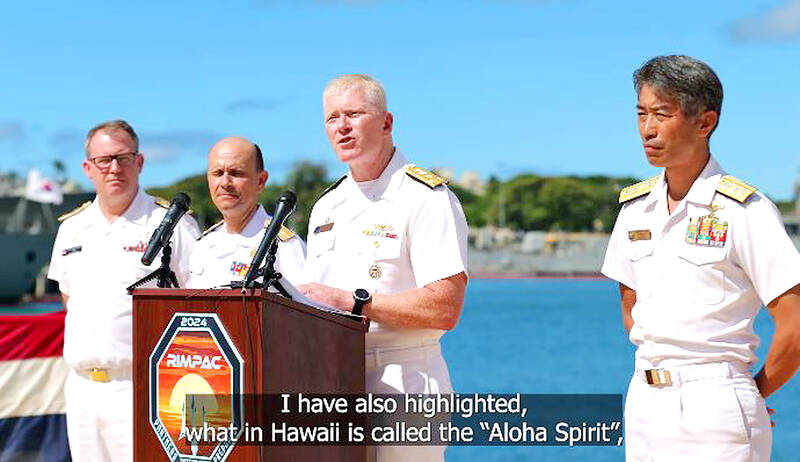The Rim of the Pacific Exercise (RIMPAC) does not single out any particular nation, but is aimed at deterring invasions, and maintaining peace and security in the Indo-Pacific region, a top US commander said on Thursday.
Vice Admiral John Wade, commander of the US 3rd Fleet, told a news conference at the launch of the multinational naval drills off Hawaii that RIMPAC aims to allow like-minded nations to operate together to handle crises ranging from natural disasters to armed conflict.
Wade, who heads this year’s RIMPAC joint forces, declined multiple requests for comment on Taiwan and its relationship with China.

Photo: screen grab from a video on Defense Visual Information Distribution System’s Web site
“RIMPAC does not single out a particular nation or send messages to anybody,” US military newspaper Stars and Stripes quoted him as saying. “We are really focused on enduring maritime force capabilities to ensure peace and prosperity in the vital Indo-Pacific region.”
However, the Chinese People’s Liberation Army was not invited to this year’s exercises due to Beijing’s “reluctance to adhere to international rules or norms and standards,” he said.
RIMPAC, which began in 1971 and is held every two years, is the world’s largest international maritime exercises.
This year it involves 29 nations, which have collectively deployed 40 warships, three submarines, 150 aircraft, 14 land-based armies and 25,000 personnel, the US Navy said in a news release.
Participating militaries are from Australia, Belgium, Brazil, Brunei, Canada, Chile, Colombia, Denmark, Ecuador, France, Germany, India, Indonesia, Israel, Italy, Japan, Malaysia, Mexico, the Netherlands, New Zealand, Peru, the Philippines, Singapore, South Korea, Sri Lanka, Thailand, Tonga, the UK and the US, the US Navy said.
Aircraft including Lockheed Martin F-35 Lightning IIs, Boeing V-22 Ospreys and Boeing P-8 Poseidons would operate out of Joint Base Pearl Harbor-Hickam and US Marine Corps Base Hawaii on Oahu, it added.
In other news, Taiwan’s Tuo Chiang-class guided missile corvettes the An Chiang and the Wan Chiang are expected to be activated next week, a source familiar with the matter said yesterday.
The ships would increase the nation’s Tuo-Chiang fleet from five to seven, concluding the navy’s plans for a prototype followed by an initial production run of six ships, the source said.
Chinese military drills near Taiwan have caused strain in the Taiwanese navy, the source said, adding that it might be forced into changing its plan for replacing the aging Ching Chiang-class with the Tuo Chiang-class on a one-for-one basis.
The Tuo Chiang, the lead ship of the fleet, and the prototype are armed with eight Hsiung Feng II and Hsiung III anti-ship missiles each, while the “flight one” corvettes utilize 16 Hai Chien II anti-aircraft missiles, eight Hsiung Feng II anti-ship missiles and four Hsiung Feng III anti-ship missiles.
The planned “flight two” corvettes, to be completed in 2026, would each have four Hsiung Feng II and eight Hisung Feng III anti-ship missiles due to their envisioned role in surface warfare.
Additional reporting by Lo Tien-pin

‘WIN-WIN’: The Philippines, and central and eastern European countries are important potential drone cooperation partners, Minister of Foreign Affairs Lin Chia-lung said Minister of Foreign Affairs Lin Chia-lung (林佳龍) in an interview published yesterday confirmed that there are joint ventures between Taiwan and Poland in the drone industry. Lin made the remark in an exclusive interview with the Chinese-language Liberty Times (the Taipei Times’ sister paper). The government-backed Taiwan Excellence Drone International Business Opportunities Alliance and the Polish Chamber of Unmanned Systems on Wednesday last week signed a memorandum of understanding in Poland to develop a “non-China” supply chain for drones and work together on key technologies. Asked if Taiwan prioritized Poland among central and eastern European countries in drone collaboration, Lin

The US government has signed defense cooperation agreements with Japan and the Philippines to boost the deterrence capabilities of countries in the first island chain, a report by the National Security Bureau (NSB) showed. The main countries on the first island chain include the two nations and Taiwan. The bureau is to present the report at a meeting of the legislature’s Foreign Affairs and National Defense Committee tomorrow. The US military has deployed Typhon missile systems to Japan’s Yamaguchi Prefecture and Zambales province in the Philippines during their joint military exercises. It has also installed NMESIS anti-ship systems in Japan’s Okinawa

The Chien Feng IV (勁蜂, Mighty Hornet) loitering munition is on track to enter flight tests next month in connection with potential adoption by Taiwanese and US armed forces, a government source said yesterday. The kamikaze drone, which boasts a range of 1,000km, debuted at the Taipei Aerospace and Defense Technology Exhibition in September, the official said on condition of anonymity. The Chungshan Institute of Science and Technology and US-based Kratos Defense jointly developed the platform by leveraging the engine and airframe of the latter’s MQM-178 Firejet target drone, they said. The uncrewed aerial vehicle is designed to utilize an artificial intelligence computer

Renewed border fighting between Thailand and Cambodia showed no signs of abating yesterday, leaving hundreds of thousands of displaced people in both countries living in strained conditions as more flooded into temporary shelters. Reporters on the Thai side of the border heard sounds of outgoing, indirect fire yesterday. About 400,000 people have been evacuated from affected areas in Thailand and about 700 schools closed while fighting was ongoing in four border provinces, said Thai Rear Admiral Surasant Kongsiri, a spokesman for the military. Cambodia evacuated more than 127,000 villagers and closed hundreds of schools, the Thai Ministry of Defense said. Thailand’s military announced that